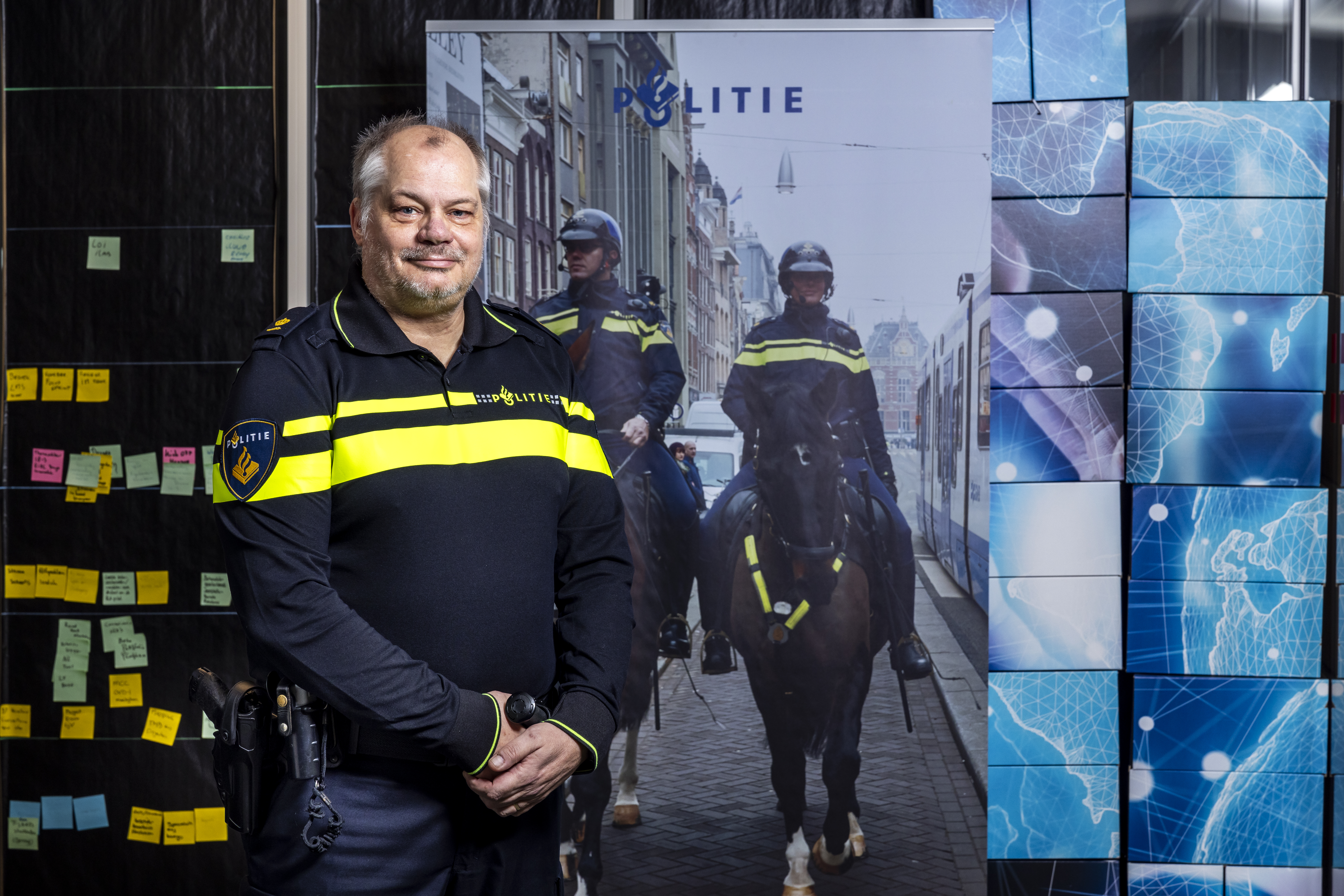
The impact of the corona pandemic on the mental health of young people. The broadcast of the Dutch BOOS online program on sexual misconduct. The uncertainty that the war in Ukraine brings for (international) students. In light of all this, the work that Lara Hofstra does – making sure students feel safe – seems more important than ever. Yet Eindhoven University of Technology (TU/e) is still the only university in the Netherlands with a Student Diversity Officer. Chief Officers do exist, but only staff members can turn to them.
“I spoke to a student who said: ‘We are behind the times, where is the extra support for female students, mental health, internationals, the LGBT+ community, students with disabilities?‘ That was heard; I have been in this position for two years now.” Hofstra sees her position – which she owes in part to the two students in the photo above who asked similar questions in the University Council meeting held in May 2019 – primarily as a win for students.”
Unease
As far as transgressive behavior is concerned, Hofstra and her team were already working on social safety issues at the university well before the broadcast of BOOS, but the program has ensured that the discussion surrounding it received a major boost. “It’s the topic of conversation everywhere: at the coffee machine, during meetings, at the bar. I see that some men find it a difficult subject and therefore behave uneasily,” the Student Diversity Officer notes.
Experience shows that it is often the older generation of men who have difficulty finding a way to approach the subject. Hofstra’s advice is invariably: ‘Talk about it, ask women around you if they like the atmosphere at work or at their study course. If there is anything that could be improved. No matter how uncomfortable that may be.’
I spoke to a student who said: “We are behind the times, where is the extra support for female students, mental health, internationals, the LGBT+ community, students with disabilities?“
Lara Hofstra
‘Managers need to take inclusivity seriously’
In the predominantly white, male tech sector – fourteen percent of them are women – a great deal still needs to be done in the Netherlands in terms of inclusivity and diversity. As awkward and uncomfortable as it may be – in companies, conversations about a safe work environment will need to be held and people will need to allow themselves to be vulnerable, according to Hofstra. “Managers in all companies will need to be open-minded and inspire employees to engage in conversation with each other. If managers do not take the issue seriously, you can forget about having an inclusive environment in the workplace.”
At TU/e, 28 percent of the total number of enrolled students in 2021 were women, however, this disparate male-female ratio creates anything but a closed or exclusive atmosphere. Hofstra: “On the contrary. Every day, I continue to be impressed by the open way in which the younger generation approaches difficult discussions. The business world and generations older than them can learn a lot from that.”

Inclusivity and diversity is about much more than just gender. For example, employees and students from different cultural backgrounds also need be taken into account, Hofstra emphasizes. “In the Netherlands, we interact much more informally with our manager or professor than in China or India. There, for example, it is not done to call your professor by her or his first name. A student from India told me that he found it so unnerving to call his professor by his first name that he spent half an hour practicing in front of the mirror at home. For everyone to feel safe, the high tech sector – both universities and industry – needs to be open to those cultural differences.”
Also read: Prince Constantijn: ‘Is a bunch of white men really the image you want to convey?’
Students deserve inspiration
Anyone sitting across from the Netherlands’ first Student Diversity Officer sees an inspired, enthusiastic woman. During the past fourteen years, she has spoken with many students and noticed that there was still a lot to achieve when it came to social themes such as mental health, social safety and inclusivity and diversity. Her signals were not always taken seriously. Yet in her current position, she has more leverage to work – together with students and the Education and Student Affairs (ESA) team – in a targeted way on these issues. “While I’m sometimes told I’d be better off not doing it anymore, I still get to do fun things with students even in this position. Taking an ice dive in the Karpendonkse pond [opposite TU/e, ed.] in my lunch break, for one thing,” Hofstra says.
Hofstra has frequent conversations with students, she asks them if they feel safe in the lecture hall and if they feel inspired enough. “Unfortunately, I sometimes hear from students that during a first lecture a professor says: ‘Half of you are not going to pass this course.’ That has a demotivating effect. You could also say: ‘This subject is difficult, but we are going to do our best and I believe in you.’ After all, we are a university, fourteen thousand young people come here every year who deserve to be inspired. It is best to be both honest and to motivate students. That should be the message for all students and we are working hard to achieve that.”
For everyone to feel safe, the high-tech sector – both universities and industry – needs to be open to those cultural differences.”
Lara Hofstra
Active bystander effect
TU/e also facilitates active bystander training. “You are sitting with colleagues and friends, and racist jokes are told. It makes you feel uncomfortable, but you don’t do anything about it,” Hofstra sketches as a real-life example. Participants learn in the training to feel self-assured in these kinds of situations and to act assertively. For example by taking someone aside and addressing their behavior one on one. Turning people into active bystanders proves to be a highly effective measure, according to the New York Times. Individuals can thereby ‘create a new reality in which damaging and discriminatory behavior is addressed through interventions.’
The training is now only offered to employees. But at the request of students, we are looking into whether the course can also be offered to them,” Hofstra adds.
Role models
In addition to facilitating discussions and training, Hofstra believes it is important for students to have a role model to look up to. For example, she hears from first-year students that they are quite interested in technology, but that hey are not always encouraged to do something in high school with that interest and pursue technological education. “Our youth are not encouraged enough to take up technical subjects. That’s where there really is a problem in our country. That not only applies to girls, but also to boys.”
“A great pity,” Hofstra feels, that students are still coming to her with these kinds of stories. She herself was consistently encouraged by her father, an electrical engineer, to choose a technological study. Yet, she lacked role models. “It’s only since walking around here and hearing female students and professors talk passionately about their field, that I’ve started thinking: ‘So, I could have done it!“
‘Finding your path’ conference
Students at TU/e no longer need to be persuaded to opt for a technical study. However, it is important to be inspired to actually go ahead and pursue a career in technology. This is why Hofstra and Masha Nejatinamin (founder of Beyond), together with Female Tech Heroes, are organizing the ‘Finding Your Path’ conference on March 16. Here, students will have the opportunity to hear inspiring stories from women who have gone before them. A conscious choice was made not to have unattainable, women-at-the-top speakers, but rather women with who students can identify with. “The women show how they got to where they are today. In all those stories you will notice that things almost never go along the route that you have mapped out for yourself. An important lesson is that you shouldn’t get discouraged when things don’t go according to plan,” Hofstra adds.
“Too often I hear that women have to be harder, more masculine to succeed. What a load of rubbish! You have to stay close to yourself. Find out what your competencies are and strengthen them. And if there are things that you find difficult, have the courage to ask for help. The business world is desperate for people who dare to allow themselves to be vulnerable.”
Image: Lara Hofstra (in the middle) with students Naomie Amsing and Arthur Nijdam. © Bart van Overbeeke








